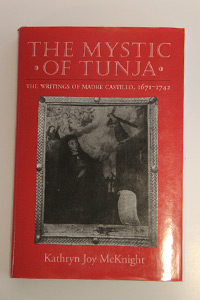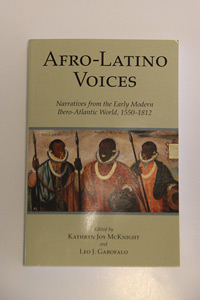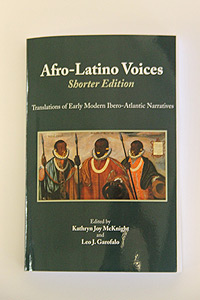Kathryn McKnight
- Colonial literature
- Early modern Hispanic nun writers
- Afro-Hispanic narratives from colonial archival documents
The Mystic of Tunja: The Writings of Madre Castillo, 1671-1742
During the fifty-three years she lived in a convent in the city of Tunja in what is now Colombia, author Madre Castillo stretched the accepted boundaries of female behavior by veiling her intellectual activities in the duties of a colonial nun. Her autobiographical writings reveal a deeply conflicted individual whose keen mind chafed against the restrictions of Counter-Reformation ideology.
In this volume, Kathryn Joy McKnight offers an insightful analysis of Madre Castillo's life and writings. She situates these writings within a tradition of female autobiography in which nuns negotiated the power to represent themselves by inscribing into their stories bleeding bodies, demonic temptations, and celestial visions.
McKnight draws on feminist and post-structural criticism, recent scholarship on nuns' writings, and extensive research in colonial archives to develop a framework for understanding Madre Castillo's life and the genre of the spiritual autobiography, so often required of mystic nuns by their confessors.
Madre Castillo's published works, Su vida and the Afectos espirituals, present a fascinating contrast in self-portraits. Proclaiming herself the center of convent scandal, the three-time abbess wrote an autobiographical tale marked by discord and self-degradation while, with greater confidence, her journal-like Afectos enters the realm of scriptural commentary where few female contemporaries dared to tread.
Buy this book
Buy The Mystic of Tunja: The Writings of Madre Castillo, 1671-1742 on Amazon

Afro-Latino Voices
A landmark scholarly achievement . . . With judicious commentary by several of the leading experts in the field, this book dramatically expands the canon of texts used to study the black Atlantic and the African diaspora, and captures the tenor of the 'black voice' as it collectively engaged the power of colonial institutions. In no uncertain terms, Afro-Latino Voices will prove to be a remarkable pedagogical tool and an influential resource, inspiring deeper comparative work on the African diaspora. --Ben Vinson III, Center for Africana Studies, Johns Hopkins University.
Buy this book

Afro-Latino Voices: Narratives from the Early Modern Ibero-Atlantic World, 1550-1812 (2009)
Ideally suited for use in broad, swift-moving surveys of Latin American and Caribbean history, this abridgment of McKnight and Garofalo's Afro-Latino Voices: Narratives from the Early Modern Ibero-Atlantic World, 1550-1812 (2009) includes all of the English translations, introductions, and annotation created for that volume.
Buy this book

